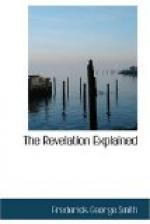“When the venerable priest had been summoned by Sigismund’s order before the Council of Constance, and had been thrown into prison, the chapel of Bethlehem, in which he had proclaimed the gospel and the future triumphs of Christ, occupied his mind much more than his own defence. One night the holy martyr saw in imagination, from the depths of his dungeon, the pictures of Christ which he had painted on the walls of his oratory, effaced by the Pope and his bishops. This vision distressed him; but on the next day he saw many painters occupied in restoring these figures in greater number and in brighter colors. As soon as the task was ended, the painters, who were surrounded by an immense crowd, exclaimed, ’Now let the popes and bishops come! they shall never efface them more!’ And many people rejoiced in Bethlehem, and I with them, adds John Huss. ‘Busy yourself with your defence rather than with your dreams,’ said his faithful friend, the Knight of Chlum, to whom he had communicated this vision. ‘I am no dreamer,’ replied Huss, ’but I maintain this for certain, that the image of Christ will never be effaced. They have wished to destroy it, but it shall be painted afresh in all hearts by much better preachers than myself. The nation that loves Christ will rejoice at this. And I, awaking from the dead, and rising so to speak, from my grave, shall leap with great joy.’” History of the Reformation, Book I, Chap. 6.
This bold witness for Christ was burned at the stake July 6, 1415, by order of the General Council of Constance. When the fagots were piled up around him ready for the torch, he said to the executioner, “You are now going to burn a goose [Huss signifying goose in the Bohemian language]; but in a century you will have a swan whom you can neither roast nor boil.” Fox’s Book of Martyrs. This was fulfilled in Martin Luther.
Henry Institorus, an inquisitor, uttered these remarkable words: “’All the world cries out and demands a council, but there is no human power that can reform the church by a council. The Most High will find other means, which are at present unknown to us, although they may be at our very doors, to bring back the church to its pristine condition.’ This remarkable prophecy, delivered by an inquisitor at the very period of Luther’s birth, is the best apology for the reformation.”
Andrew Proles, provincial of the Augustines, used often to say: “Whence, then, proceeds so much darkness and such horrible superstitions? O my brethren! Christianity needs a bold and a great reform, and methinks I see it already approaching.... I am bent with the weight of years, and weak in body, and I have not the learning, the ability, and eloquence, that so great an undertaking requires. But God will raise up a hero, who by his age, strength, talents, learning, genius and eloquence, shall hold the foremost place. He will begin the reformation; he will oppose error, and God will give him boldness to resist the mighty ones of the earth.”




